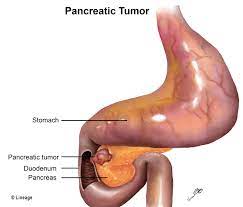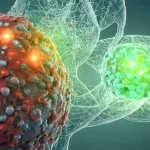Deadliest cancer could be detected early with a stool sample, research suggests
 A new study has found that stool samples may hold the key to early detection of pancreatic cancer. By analyzing microorganisms found in the stool, researchers have identified a microbial profile that is consistently present in individuals diagnosed with pancreatic cancer. This breakthrough could potentially lead to the development of a non-invasive screening test for early diagnosis of the disease.
A new study has found that stool samples may hold the key to early detection of pancreatic cancer. By analyzing microorganisms found in the stool, researchers have identified a microbial profile that is consistently present in individuals diagnosed with pancreatic cancer. This breakthrough could potentially lead to the development of a non-invasive screening test for early diagnosis of the disease.
The Study’s Findings
Pancreatic cancer is known for its low survival rate, with only about one in four patients surviving for one year or more after diagnosis. The difficulty in treating pancreatic cancer lies in its late-stage detection, as symptoms often go unnoticed until the disease has progressed.
The study, which involved 136 participants, discovered that 27 different kinds of microbes were abundant in the stool samples of individuals diagnosed with pancreatic cancer. This microbial profile was consistent across patients at all stages of the disease.
Dr. Helen Rippon, the Chief Executive of Worldwide Cancer Research, commented on the significance of this discovery, stating that it builds on the growing evidence linking the microbiome – the collection of microorganisms that live in our bodies – to the development of cancer. She expressed excitement over the possibility of using stool samples to diagnose pancreatic cancer early, as early detection is crucial for improving treatment outcomes.
Potential for a New Screening Program
The research included patients with both early-stage and advanced pancreatic cancer, as well as control groups without cancer and patients with chronic pancreatitis. The microbial profile identified in the stool samples was accurate in detecting the most common form of pancreatic cancer, known as pancreatic ductal adenocarcinoma.
Following the study, researchers concluded that it is feasible to develop a screening program using stool samples from individuals. A patent has already been applied for the development of a pancreatic cancer diagnostic kit that detects the specific microorganisms in stool samples rapidly.
Dr. Chris MacDonald, the Head of Research at Pancreatic Cancer UK, emphasized the urgent need for more accurate biomarkers for pancreatic cancer detection. He expressed the importance of leaving no stone unturned in the search for new methods of early diagnosis.
What is Pancreatic Cancer?
Pancreatic cancer originates in the tissues of the pancreas, an essential organ located behind the lower part of the stomach. The pancreas plays a crucial role in digestion by producing enzymes that the body needs to process food, and it also releases hormones, including insulin, to regulate blood sugar.
Pancreatic cancer develops when cells in the pancreas begin to grow uncontrollably, forming a tumor.
The exact cause of these cellular changes is often multifaceted, involving genetic mutations, chronic inflammation, and environmental factors, among others. Notoriously stealthy, pancreatic cancer frequently remains undetected in its early stages, often only presenting symptoms when it’s more advanced.
This makes it one of the deadliest forms of cancer. Its rate of progression can vary depending on the type and stage at diagnosis, but in many cases, it’s aggressive, with tumors quickly spreading to nearby organs and distant parts of the body.
Celebrity cases of Pancreatic Cancer
Pancreatic cancer has sadly claimed the lives of many talented individuals. Here are some notable celebrities, including Patrick Swayze, who died from pancreatic cancer:
Patrick Swayze: The famed actor, known for his roles in films such as “Dirty Dancing” and “Ghost,” was diagnosed in January 2008 and passed away in September 2009.
Steve Jobs: While often associated with pancreatic cancer, it’s important to note that the Apple co-founder had a rare form of the disease called a pancreatic neuroendocrine tumor. He died in 2011.
Alan Rickman: The British actor, renowned for his roles in the “Harry Potter” series, “Die Hard,” and many other films, passed away in 2016.
Michael Landon: The actor, famous for “Little House on the Prairie” and “Bonanza,” was diagnosed in April 1991 and died just a few months later in July 1991.
Luciano Pavarotti: The legendary operatic tenor passed away in 2007 after a year-long battle with the disease.
Joan Crawford: The iconic Hollywood actress, known for her roles in classics like “Mildred Pierce,” died from the disease in 1977.
Jack Benny: The famed comedian and vaudeville performer died in 1974 due to pancreatic cancer.
Donna Reed: Academy Award-winning actress and star of “It’s a Wonderful Life” passed away in 1986.
Signs & Symptoms of Pancreatic Cancer
Detecting pancreatic cancer in its early stages is challenging for several reasons:
Location of the Pancreas: The pancreas is located deep within the abdominal cavity, behind the stomach. This makes it difficult to palpate or feel during routine physical examinations.
Non-specific Initial Symptoms: Early symptoms of pancreatic cancer are often vague and can be easily attributed to other, more common conditions. Symptoms like indigestion, weight loss, or back pain are not uncommon in other illnesses, making it easy to overlook the possibility of pancreatic cancer.
Lack of Early Detection Tests: Unlike some other forms of cancer, there isn’t a standard or routine screening test for pancreatic cancer. The CA 19-9 blood test and imaging tests can help in diagnosis, but they are typically used for individuals already suspected of having the disease or who have certain risk factors.
Silent Progression: In many cases, pancreatic cancer does not cause noticeable symptoms until it has advanced to a later stage or spread to other parts of the body. This silent progression further hampers early detection.
When symptoms of pancreatic cancer do appear, they can vary depending on the size of the tumor and its location within the pancreas. Common symptoms like jaundice, digestive problems, and abdominal pain typically show up in more advanced stages or when the tumor obstructs the bile duct or stomach. Unfortunately, by the time symptoms become pronounced, the cancer has often reached an advanced stage or metastasized to other organs, complicating treatment options and outcomes.
Below is a list of the most common symptoms:
Jaundice: Yellowing of the skin and the whites of the eyes, often accompanied by dark urine, pale stools, and itching.
Pain: Abdominal or back pain, which may come and go and might be worse after eating or lying down.
Digestive problems: Unexplained weight loss, loss of appetite, nausea, and vomiting.
Pancreatic exocrine insufficiency: Difficulty digesting food due to a lack of pancreatic enzymes, leading to steatorrhea (fatty, foul-smelling stools).
Blood clots: Especially in the large veins of the legs (deep vein thrombosis or DVT).
Diabetes: Onset of diabetes or worsening of pre-existing diabetes without a clear reason.
Fatigue: Feeling unusually tired or weak.
Enlargement of the liver or gallbladder: As detected by a doctor during a physical examination.
Bloating: Feeling full quickly or bloating after meals.
Ascites: Build-up of fluid in the abdomen.
Remember, having one or more of these symptoms doesn’t necessarily mean someone has pancreatic cancer, as many of these symptoms can also be caused by other conditions. However, it’s important to consult a doctor if any of these symptoms persist or are of concern.
The Importance of Early Detection
Early detection of pancreatic cancer is crucial for improving survival rates and treatment outcomes. Currently, only 20% of individuals with pancreatic cancer are diagnosed at an early stage, primarily due to the non-specific symptoms associated with the disease.
Common symptoms of pancreatic cancer include back pain, indigestion, weight loss, and changes in bowel movements. However, these symptoms can also be attributed to less serious health conditions, leading to delayed diagnosis.
Dr. MacDonald stressed the need for an early detection tool that can help doctors diagnose more individuals at an early symptomatic stage, allowing for timely treatment that could potentially save lives.
The Potential of the Microbiome in Cancer Research
Researchers believe that this study highlights the potential of the microbiome in cancer research. The microbiome, which consists of fungi, bacteria, and viruses that live inside our bodies, plays a significant role in our health and immune system function.
While there is still much to learn about the symbiotic relationship between the microbiome and disease, innovative research like this is crucial for advancing our understanding. Exploring further research to develop a new microbiome biomarker for pancreatic cancer detection in individuals with vague symptoms is a promising direction for future investigations.
Overall, the identification of a microbial profile in stool samples that is consistently linked to pancreatic cancer brings hope for the development of an effective, non-invasive screening test for early detection. This breakthrough could potentially improve survival rates and treatment outcomes for individuals with pancreatic cancer.
The post Deadliest cancer could be detected early with a stool sample, research suggests appeared first on Healthy Holistic Living.











